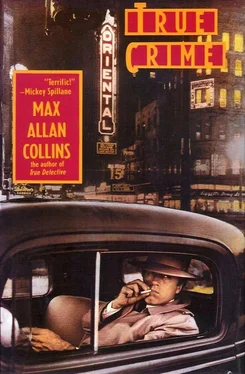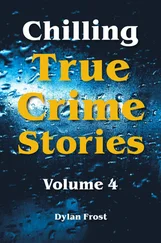“I’m Nathan Heller,” I said. “Would you tell Mr. Piquett I’m here to see him?”
“Have you an appointment?”
“No.”
“I’m afraid Mr. Piquett’s a busy man.”
The office wasn’t exactly jumping: we two were alone in the reception area, and there were no sounds from behind the doors marked PRIVATE.
“Just let him know I’m here, would you?” I said, and smiled politely, letting her know her chorus-girl beauty didn’t interest me particularly, which I could tell bothered her. She was the sort who resented you for noticing she was pretty but if you didn’t, resented you for that. I sat down. She knocked on Piquett’s door and went in and in a minute or so came out looking vaguely confused, then covered it quickly with that businesslike manner.
“He’ll see you,” she said, and I started to rise, but she motioned me back. “It’ll be a few minutes.”
And she returned to her typing.
I sat and read one of the handful of magazines on a small glass-and-chrome table between two of the chairs; a Saturday Evening Post from the second week of January. Between the air conditioning and pictures of kids building snowmen, I was ready to find myself a pair of snowshoes.
The frosty receptionist answered the phone on her desk and it was an inner-office call; she glanced up at me disinterestedly and said, “You can go on in, now.”
I’d been waiting half an hour.
Piquett was seated behind his desk, paperwork spread out across it unconvincingly. He’d kept me waiting on purpose; why, I didn’t know. But one thing was for sure: Piquett wasn’t a paperwork-style lawyer.
He’d never been to law school; he studied the law books while working as a bartender and waiter. That much was well known by the public at large, who viewed him as a colorful character. Lesser known was Piquett’s stint as a hanger-on at police precinct houses, carrying messages to lawyers and bail bondsmen, as sort of an apprentice ambulance chaser. Ward heelers and politicians, as well as various underworld characters, were valuable connections made in those days by the would-be lawyer (rumor had it he tried out for the bar a dozen times before passing). And working as a waiter and bartender in road-houses and, later, in various Loop and North Side restaurants and taverns enabled Piquett to make some good, lasting friendships.
One of which, you would think, was the friendship between Piquett and Heller, the way the stocky little man stood and smiled and flung his hand out toward me. I shook it, and he gestured for me to sit in a chair opposite him, and I did, but he remained standing.
For a small man, he cut an impressive figure. Even on this warm day (albeit in an air-cooled office), he wore a three-piece suit, though nothing fancy; the vest and gray-speckled tie were for respectability, but the slightly worn look of the suit was for Clarence Darrow mock-humility.
“It’s good to see you again,” he said, with a disarming half-smile. His features were crowded toward the center of his chubby face — bright eyes, bulbous nose, tiny mouth; dark circles under the bright eyes gave him an intensity, and the effect was at once boyish and fatherly. His most striking feature, however, was his hair: a three-inch-high salt-and-pepper pompadour rose in startled waves, as if he’d stuck his finger in a socket.
“Nice to see you, too, Counselor,” I said, smiling faintly. The only time I’d ever seen him had been in court, in the Lingle murder case. I’d been testifying for the prosecution; he’d been the defense lawyer. Still, we’d been on the same team. Both of us were helping railroad a Syndicate patsy named Leo Brothers, Piquett’s client, who’d been chosen by the Capone crowd to take the rap.
“What brings you here, Mr. Heller?” He sat.
“I wanted to thank you for referring one of your clients to me. I sure can use the business.”
He brushed a hand over the pompadour and it did a little dance. “I don’t remember having recommended your services, Mr. Heller. Although I may have. You did reliable work for me, and my client, last year.”
All my dealings with Piquett on that job had been via intermediary or phone.
“But you don’t specifically remember recommending me to anyone?”
He shrugged, smiled like a pixie. “Sorry. I’d love to be of help. And I’ll certainly keep you in mind, for future referrals. I do, however, have a permanent investigator on staff.”
“I see. Do you know a John Howard?”
Piquett thought, then slowly shook his head. “Can’t say as I do.”
“He’s a traveling salesman.”
Piquett shook his head slowly, no.
“Works for a feed and grain company. Whose bosses gave him your name.”
Piquett shook his head slowly, no.
I described my client; Piquett shook his head.
“This isn’t good,” I said.
“Why is that?”
“I appear to have been used to set somebody up.”
“How so?”
“Mr. Piquett, my guess is that you already know the answer to that question.”
His round face took on a cherubic innocence that would’ve fooled most any jury.
He said, “I really don’t know what you mean, Mr. Heller.”
“You don’t.”
“I do not. I haven’t the slightest idea what point you’re trying to make.”
“Well, I’m no orator. That’s not my line. I’m just a detective who doesn’t like being played the fool.”
“No one does, Mr. Heller.”
“I understand you’re representing John Dillinger these days.”
With a tiny smile, Piquett said, “That’s correct.”
“The first time I ran into you, you were defending Leo Brothers — a man accused of killing Jake Lingle... a friend of yours. In fact you were one of the last to see Jake Lingle alive. And yet you defended the man accused of killing him.”
“Everyone deserves representation under the law, Mr. Heller. That’s the American way.”
“And on that job I did last year for you — your client was Al Capone.”
A small noncommittal shrug. “Yes.”
“And now you’re representing John Dillinger. Don’t you ever represent anybody who isn’t a gangster or a thief?”
Hands folded on his desk, he smiled like a child and said, “They’re the only ones who have money these days, Mr. Heller.”
“What I don’t get is why you’re helping set up your own client. The reward money’s substantial, but Dillinger himself ought to be pretty well fixed by now...”
Piquett stopped smiling. “If you’re implying that my client, Mr. Dillinger, is in some danger at the moment, that’s hardly news. Every lawman in the country is gunning for him. But I would hardly betray my own client, Mr. Heller. And if you have knowledge of any... conspiracy to do him harm, why, I’d be grateful for details.”
“You’re a slick one, I’ll give you that.”
“You flatter me, Mr. Heller.”
“Do I. Let me tell you something, Piquett — I got off the force and into private business because I was sick and tired of being pulled into this scam and that one. I got good and fed up with being up to my butt in graft and bullshit. And I didn’t — and don’t — like being played a patsy, particularly where setting somebody up for a kill is concerned. So I’m not taking kindly to being pulled into this setup, whatever the hell it’s really about.”
“I thought you said you weren’t an orator, Mr. Heller.”
“I’m not. But whoever decided to use me in this one made a bad mistake. Because I’m pulling the rug out from under this whole damn deal. Got it?”
“I haven’t the faintest notion of what you’re talking about.”
“Do you know Anna Sage?”
“I’m afraid I don’t.”
“Martin Zarkovich?”
Читать дальше












